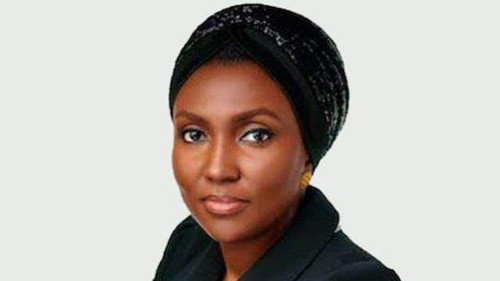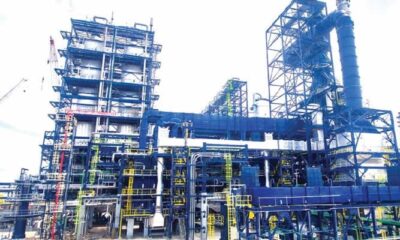BIG STORY
Government Plans Evacuation, Camps As Flood Hits 28 States, Claims 175 Lives, Displaces 207,902 — NEMA
Published
1 year agoon

The heavy rains and flooding that have wreaked havoc across the country in recent times have spread across 28 states, claiming 175 lives and displacing 207, 902 others.
This is according to the National Emergency Management Agency (NEMA).
Authorities have enjoined residents in flood-prone areas to relocate as the rains persist, following the Nigerian Meteorological Agency’s warnings about the heavy rainfalls, urging preparedness for potential floods.
It was gathered that state governments, in partnership with NEMA, had commenced moves to evacuate residents in flood-prone areas to avert further disaster.
The Director-General of NEMA, Zubaida Umar, further revealed that the agency had activated the National Emergency Operation Centre following the recent flooding.
Umar, who stated this on Wednesday when the Chief of Staff to the President, Femi Gbajabiamila, visited the agency following the recent retreat for chief executives of agencies under the Presidency, noted that the activation of the centre was to streamline disaster response efforts and act as a command centre for resource management and communication.
She said, “The 2024 flooding has affected 28 states across 133 Local Government Areas. The flood has displaced 207,902 persons, affected 526,703 persons, affected 79,138 houses, 1,971 injuries sustained, 106,178 hectares of farmlands affected and 175 lives have been lost.”
She said the agency had carried out disaster assessments in almost all the states, including Ogun, Rivers, Imo, Lagos, Ekiti, Edo and Kwara, for various incidents.
“The most recent for flood assessment are in Zamfara, Katsina, Jigawa, Adamawa, Sokoto, Bauchi, Taraba, Kebbi, Kano, Benue, and Kogi,” she added.
She highlighted that the agency had coordinated response to 158 emergencies, aided 118,337 individuals, rescued 4,706, and reported 1,414 fatalities.
In his response, Gbajabiamila urged the agency to not just focus on disaster mitigation but should prevent disasters.
“The mandate that NEMA has is two-pronged. One is the prevention of disaster, the other one is to mitigate disaster when it does happen. But it appears that we concentrate mainly on the mitigation of disaster, and leave, to a very large extent, the other side of the mandate, which is prevention.
“I think in turning the page it is important that we begin to look more closely at the issue of prevention. A lot of these disasters can be prevented, and that is what NEMA is set up to do. As the saying goes, prevention is better than cure. And that’s the area that I think we now should begin to look at,” he stated.
The Chief of Staff to the President further stated that flooding, as has been observed, is a perennial problem in Nigeria.
“A lot of this flooding can be prevented or at least reduced,” he added.
When contacted and asked to provide additional details on what NEMA was doing with state governments to tackle the menace caused by the surging floods, the agency’s spokesperson, Ezekiel Manzo, said it was the primary responsibility of states to evacuate residents in flood-prone areas, but noted that NEMA was supporting the states.
“It is the primary responsibility of state governments to evacuate their citizens living in flood-prone areas and some of them are doing that. We are assisting them and giving other assistance to the affected states,” he said.
Manzo further pointed out that the tradition of floods was already manifesting, stressing that the agency was “calling on all stakeholders to activate all plans and preparations for the floods.”
He said, “We have reached the point where floods are becoming imminent. It is crucial that proper support is given to those already affected, and awareness is raised about the forecasted floods. For areas not yet flooded but on the flood’s track, preparations should be made to mitigate and avoid potential losses.
“Additionally, based on past patterns, many flood-prone areas in the northern part of the country will soon experience these floods moving toward the central and southern parts. Now is the time for all arrangements, plans, and preparations for flood studies to be activated. We urge local communities, Local Governments, and states to activate their plans and take action to mitigate the consequences of floods. People living in flood-prone areas should be advised to move to higher ground immediately.”
He also stated that in “light of recent events in Jigawa, Bauchi, Zamfara, Kaduna, Zaria, and other places, it is evident that this is a serious situation. Rising sea levels and water levels in the upper parts of Niger (Republic) are a cause for concern. Once the water rises from there, it naturally flows down to Nigeria. Therefore, those living along the plains should prepare to move out of high-risk areas.”
The NEMA official said floods in Nigeria were not necessarily from the rivers themselves but were often the result of rainfall within the country.
“When rains from the upper parts of the Niger and Benue rivers combine with local rainfall, the consequences for people living near riverbanks can be severe. Residents in states like Kogi, Anambra, Delta, Imo, Rivers, and Bayelsa should immediately activate evacuation plans to avoid being caught in the flooding.
“Similarly, states like Kebbi, which is the entry point for the River Niger, should be ready to evacuate. As the river rises from the upper parts, Kebbi will be the first point of contact, and residents there must be prepared to move to higher ground if necessary.
“We will continue our efforts to raise awareness and ensure the safety of our communities. I am committed to this cause and will continue working diligently on it,” Manzo stated.
It was learnt that an estimated 70,000 persons have been resettled in over 80 Internally Displaced Persons Camps in the northern region due to the flooding.
President Bola Tinubu sympathised with flood victims nationwide and has committed to providing necessary support to help them recover from the devastation.
In a statement on Wednesday, the President, through his Special Adviser on Media and Publicity, Ajuri Ngelale, promised that relevant agencies would issue timely warnings to help reduce the effects of environmental disasters.
The statement read in part “President Bola Tinubu receives the news of the devastation wreaked by floods on communities and farmlands across the country with profound grief.
“The President sympathises with all victims of these ravages of nature, especially bereaved families, farmers, displaced communities, and those who have lost property.
“President Tinubu re-emphasises the need for concerted effort to address existential environmental concerns and build a more climate resilient and adaptive society.
“The President prays for the repose of the souls of the deceased, while assuring Nigerians that his administration, through the relevant agencies, will continue to provide the needed support for victims, as well as timely warnings to mitigate the impact of environmental mishaps.”
Following the damaging effects of the ravaging floods, the House of Representatives Committee on Ecological Funds visited affected states for possible remedy.
The Chairman, House of Reps Committee On Ecological Funds, Dr Sani Jaji, who led the other members of the committee to all the states affected by the floods for a first-hand assessment of the situation for possible remedy, stated on Monday in Dutse, the Jigawa State capital, that the committee would work to ensure that sustainable measures were provided to ensure that all states affected were assisted to restore normalcy to their vulnerable victims.
He said, “Jigawa is one of the states affected by flooding, gully erosion, desertification and land degradation, hence the need for the committee to do all it can to offer solution to the problems confronting the people of the state is enormous.
“The oversight visit was at the instance of the Jigawa state Governor Malam Ummaru Namadi in Dutse and other strategic places within the state.”
Responding, Governor Umar Namadi informed the committee that this year alone 23 out of 27 Local Government Areas of Jigawa State were badly affected by the floods, adding that about 40,000 households were directly affected.
In addition, he said, 7000 houses were destroyed or submerged by the heavy rainfall, noting that about 6,500 farmlands were destroyed in the above-mentioned LGAs, adding that that close to 8000 people were displaced and taking refuge at several undesignated IDP camps within the state.
Providing the internal measures put in place to guard against frequent occurrence of the disaster, Namadi stated that his administration had championed the planting of 5.5 million trees within the state.
Also worried by the menace of the floods, the Speaker of the House of Representatives, Abbas Tajudeen, said the floods had taken over a large number of the farmlands in the north.
“Speaker Abbas, while empathising with the victims lamented that such an unfortunate incident happened at a time when people were making efforts to make ends meet. He called for an urgent intervention to provide succour to the victims, urging them to stay calm while the government made efforts to address their plight,” Abass Special Adviser on Media and Publicity, Musa Krishi, said in a statement.
Meanwhile, the Kano State Emergency Management Agency says it is compiling the list of flood victims from the affected LGAs of the state.
About 17 out of the 44 are reportedly affected by flooding in Kano State.
The Executive Secretary of the agency, Alhaji Isyaku Kubarachi, said, “We can’t give any information on the issue because we’re still waiting for a comprehensive report from the affected LGAs.”
The Adamawa SEMA office disclosed that the flood victims in Madagali alone were 10,246, with eight IDP camps set up in in the Shuwa, Madagali Local Government Area.
The other affected LGAs are Madagali, Yola-south, Yola-North, Fufore, Numan, Demsa, Lamurde, shelleng, Guyuk, Mayo-Belwa, Song, Toungo.
In his assessment of the flood, the head of operations Yola office of NEMA, Ayuba Ladan, stated that dozens of people were displaced and several wounded following flooding in the state.
Ladan said the Nigerian Red Cross and other non-governmental organisations were working to provide drugs and render other assistance to the victims in the different parts of the state.
He pointed out that over 10,000 persons were displaced and 10 others injured, stressing that Madagali LGA, in collaboration with the Nigeria Red Cross, had established eight IDP camps to cater to the survivors.
In Katsina State, no fewer than 11 LGAs have been submerged by severe flooding following a seven-day downpour.
The affected LGAs are Mai-Adua, Jibia, Batsari, Daura, Mani, Bindawa, Kaita, Katsina, Batagarawa, Musawa and Malnumshi.
According to The Punch, the Katsina State Executive Secretary, State Emergency Management Agency, Binta Dangani, said “Yes, Katsina has recorded floods in 11 LGAs. There were casualties. The state government is mobilising relief materials after we have the full data of the casualties. There is a record of the dead and destruction of properties.
“We are taking a tour around the affected areas to ascertain the level of damage and to come up with a comprehensive list as well as immediate assistance to the victims. However, we have since visited the affected persons and paid condolences to families of the deceased.”
NEMA Gombe Head of Operations, Ummunah Ahmad, said the state had done a lot of sensitisation to mitigate the effects of the floods.
“We did a lot of sensitisation in flood affected areas and for areas with effects of flood we are still on the assessment. Any assessment we handle we usually ascertain level of damages and write to NEMA headquarters.”
Although the state has so far been spared the devastating effects of the floods, Executive Secretary of the Kogi State Emergency Management Agency, Muktar Atimah, disclosed that 42 IDP camps have been activated in preparation for any flooding eventuality.
“The governor has given us the marching order to continue to monitor the situation of the River Niger and report back to him on a daily basis,” Atimah said.
“Right now, the River has risen by six inches, immediately it hits up to eight inches we will commence evacuation of those who are yet to move to higher grounds as advised by the government in the last one month.
“Right now, all our IDP camps have been adequately stocked with emergency relief materials to give the would-be displaced persons immediate relief as soon as they are evacuated to the camps.”
Remarkably, while most states in the North were affected by the flooding, Plateau State farmers say they are counting their losses over the persistent lack of rainfall.
The Plateau State chapter of the All Farmers Association of Nigeria said the situation was giving the association cause for concern.
“We have contacted officials of the meteorological agency over the situation, and they have assured us that we will still have enough rainfall by next month. So, we are still hoping that it will happen. We are also praying because the situation equally needs God to intervene,” spokesman of the association, Wukaska Bako Gowon, said.
“But while we are waiting, we believe that the government can help the farmers to salvage the situation and that is why we are calling on the government to provide short term seeds for farmers to enable them grow back the ones they have lost.
“We also want the government to find ways to make water boreholes available for farmers so that they can easily irrigate their farms whether we have rainfall or not. We believe that the situation will be remedied if these essentials are addressed.”
When contacted, Executive Secretary of SEMA, Plateau State Emergency Management Agency, Sunday Àbdu, said, “Honestly, the current drought being experienced is beyond us as an agency. There is nothing we can do. Luckily, the situation is a global phenomenon and not peculiar to Plateau State alone, and the agency responsible for informing the populace on the weather forecast predicted the current situation a long time ago.”
It was gathered that both Sokoto and Kebbi states have been experiencing consistent rainfall in recent weeks.
Six LGAs in Sokoto have experienced flooding in recent times due to the excessive rainfall.
According to a statement made available to our correspondent by the spokesman of the state SEMA, Abdullahi Ghani, farmlands in Tangaza, Gudu, Gada, Tambuwal, Tureta, Rabah LGAs are mostly affected.
The state Chairman, All Farmers Association of Nigeria, Jamilu Sanusi, said, “On flooding, about 20,000 hectares of land scattered across the 23 Local Government Areas of the state are affected. The economic value of the lands affected can be put at about N600m while about N3bn was lost to insecurity this farming season alone.”
Meanwhile, the state SEMA remarked that it was already collating the number of affected farmlands to ascertain the level of damage.
“We are working together with NEMA officials to ascertain the extent of damage and the cost of crops or farms affected. We are also collating the number of farmers affected, but for now, we cannot come out with the cost as it is still work in progress,” Director of Operations for the state agency, Mustapha Umar, said.
Also, the Federal Government has earmarked N3bn as intervention funds to tackle flooding in Nasarawa State.
At an expanded State Executive Council meeting on Saturday at the Government House in Lafia, Governor Abdullahi Sule called for the immediate establishment of a special committee to ensure the judicious use of the intervention fund.
“The committee will oversee the proper disbursement of the funds to affected communities, ensuring that the intended beneficiaries receive the necessary support,” the governor stated.
“We want to make sure that every kobo spent is accounted for and is related to flood.”
As more states continue to reel under the weight of their losses, the National Flood Early Warning System Center, under the Federal Ministry of Environment, said it had issued a warning of potential flooding areas across the country due to heavy rainfall expected between August 25 and August 29, 2024.
Despite the prediction, recent rainfall patterns observed between Sunday August 24 and Tuesday August 27 have been moderate.
Dr. Baba Jalo, Director of Rescue Operations at the Yobe State SEMA stated that the flood situation was currently improving in the state, with no new reports received.
Earlier measures taken by the state government include providing cash, food and non-food items to support flood victims.
Also, Borno State pointed out that 54 communities within the state were ravaged by flood.
The Borno SEMA confirmed that following the 2024 predictions by the Nigeria Metrological Agency, 54 communities across 13 LGAs had suffered severe flooding this year.
The agency’s Director-General, Barkindo Saidu, who disclosed this on Wednesday in Maiduguri during a telephone interview, said the affected areas were not far from the predicted locations by NiMet, which had anticipated that nine LGAs in the state would experience severe flooding this year.
The LGAs are Maiduguri, Kaga, Mobar, Bama, Abadam, Ngala, Kala-Balge, Dikwa and Jere.
“Between February and March, we got a preliminary report from NiMEt that there are certain areas in the state that are prone to flooding. We informed the governor about it and he directed us to carry out our mandate of preventing incidences and responding to emergencies. We used the various communication channels, including radio, and other mediums to sensitise our people. This is why the severity on them is lesser this year,” Saidu said.
The Bauchi SEMA through its Director General, Mas’ud Aliyu, while urging residents living around the waterways to vacate their home, stated that the Bauchi State Government had donated food items to flood victims.
He said, “All those around the waterways and areas with a history of flood should do themselves the favour of vacating their houses. So far, four people have been recorded dead in the flood disaster which ravaged communities in Shira, Giade, and Katagum Local Government Areas of Bauchi State. Giade, Katagum, and Shira Local Government Areas are the LGs most disturbed by the flood.”
The Niger State Government said it was looking forward to a disaster-free 2024 rainy season despite projections of flooding in some states by the Ministry of Environment.
The ministry listed Niger among eight states that would experience flooding in the coming days.
The Niger State Commissioner for Information, Binta Mamman, said the state government had put measures in place to ensure that residents were protected against the flooding.
“Governor (Mohammed) Bago has been in constant touch with the Ministry of Environment and the State Emergency Management Agency and also provided all the logistics needed to ensure that the people are not adversely affected by any flooding,” she said.
Also, the state Commissioner for Environment and Climate Change, Yakubu Kolo, said they had concluded arrangements to forestall any impending flooding.
“We are aware of the strategic position the state occupies and the impact of flooding in the past, so, we are determined that our people will not suffer from flooding. Already, we have sensitised all the major stakeholders and provided alternative settlements in the event of displacement by flooding,” Kolo said.
Niger SEMA said it had started monitoring the water level and sensitising residents, especially those within the LGAs prone to flooding on the need to be on the alert and move to the upland area in the event of flooding.
In 2023, some of the Niger LGAs affected by the floods include Mokwa, Gbako, Lavun, Edati, Lapai, Agaie, Rijau, Katcha, Chanchaga, Magama and Mariga, where several lives were lost and goods worth millions of naira lost.
The Information Officer of the Benue State Emergency Management Agency Tema Ager stated on Wednesday that 13 LGAs were affected by flooding in the state.
He said, “We are sensitising people living in lower levels to move to the upper places. Those that were the worst hit before the seizure of rain in July were given tokens. When there is any intervention from NEMA, we will get to them, victims are staying with their relatives, and we don’t pray to have a repeat of the 2012 flooding experience.”
Kwara State has yet to experience flooding this year but it was learnt that the state government was on the alert after NEMA warned Kwara communities that flooding was imminent in five LGAs.
Mrs. Zubaida Umar, the Director-General of NEMA, stated this during the 2024 Downscaling of Flood Early Warnings Systems at States Levels.
She listed the LGAs under high and moderate flood risk areas as Pategi, Edu, Kaiama, Asa and Baruten.
Quoting the Nigerian Hydrological Service Agency 2024 Annual Flood Outlook, she said 31 states with 148 LGAs have been identified to be within the high flood risk areas.
“Similarly, sectors of agriculture and food security, Water, Sanitation and Hygiene, education, health, transportation, security amongst others are to set up mechanisms for disaster preparedness and risk reduction based on the early action strategies,” she said.
Also, the state Commissioner for Environment and Forestry, Hajia Nafisat Buge, stated that the National Hydro-Electric Power Producing Areas Development Commission ordered a N613m Patigi erosion and flood control dyke project, which she described as ongoing efforts to combat environmental challenges and improve the lives of the citizens in the area.
Although also not relatively affected by the floods, states in the southern part of the country are putting in place measures to mitigate the menace barring any occurrence.
Anambra State Government said it would open camps to accommodate persons in the eventuality of flooding, following the rising water levels of the River Niger as a result of the upstream activities in Niger Republic and Mali.
The state government made this known through the State Emergency Management Agency, adding that about eight out of the 21 LGAs in the state might likely be affected by the impending flood.
Anambra SEMA spokesman, Hilary Ogana, said some of the IDP camps used previously by the displaced persons would not be used anymore as they had been converted to other uses.
He said, “The camps would be opened for the displaced people to stay in pending when the flood would subside and they could return to their homes.”
The state Commissioner for Information, Sir Paul Nwosu, on his part, listed some of the flood-prone communities to include Anambra East, Anambra West, Onitsha North, Onitsha South, Awka North, Ihiala and Ogbaru local government areas just as he advised the residents to be on the alert.
Governor Chukwuma Soludo had earlier warned residents of the state to be fully prepared for the flooding.
Soludo said, “We’ve been receiving all manner of warnings for Anambra to deal with the expected massive flooding. Anambra is preparing as one of the states that will be most badly hit.
“The last time it happened, about two years ago, eight local government areas were totally swamped with flooding, damaging goods and wealth and assets, worth into hundreds of billions of naira, displacing hundreds of thousands of persons. This is going to cost the state a humongous amount of money.
“The Federal Government, for example, sent some 24,000 bags of rice, which we are keeping for this particular major emergency that is expected to happen any moment from now.”
Credit: The Punch.
You may like
-


Bulk Fuel Buyers Dump Middlemen For Direct Dangote Supply
-


Ibas Rejects Rivers Assembly’s Move To Probe Six-Month Spending
-


FG Revokes 1,263 Mineral Licenses For Annual Service Fees Default
-


Lagos Commissioner Tokunbo Wahab Highlights Coastal Challenges, Waste Management Reforms At Harvard Climate Panel
-


Two Criminals Who Robbed, Attempted To Kill Lil-Kesh In Lagos Arrested In Kano
-


How Police Tracked, Arrested Notorious Suspect John Samuel Who Shot, Robbed Gbenga Obama At His Epe Hideout
BIG STORY
Bulk Fuel Buyers Dump Middlemen For Direct Dangote Supply
Published
7 hours agoon
September 22, 2025
Bulk fuel buyers and filling station operators across the country are abandoning intermediaries in favour of direct delivery from the Dangote Refinery, following the launch of its free logistics fuel distribution initiative.
This development was disclosed by the President of the National Association of Road Transport Owners (NARTO), Yusuf Othman, during a live interview on TVC News. Othman criticised the refinery’s free delivery system, saying it is undermining existing agreements between bulk fuel users and transporters affiliated with NARTO.
Othman explained that NARTO members operate approximately 30,000 trucks and cannot afford to provide fuel transportation services at no cost. He noted that many of the agreements—both formal and informal—entered into with clients are now being jeopardised.
According to him, many companies had entered into service agreements with NARTO members, some of which were used as collateral to secure bank loans for the purchase of delivery trucks. He lamented that those deals are now under threat, as Dangote Refinery offers free direct delivery to customers.
“Although there has been no formal notification, we have received credible information that customers are being supplied directly, in violation of existing contracts. This has sparked widespread concern among our members,” Othman said.
He called on the Federal Government and the Nigerian Midstream and Downstream Petroleum Regulatory Authority (NMDPRA) to intervene, citing Section 212 of the Petroleum Industry Act (PIA), which he claims prohibits such practices.
Othman urged the Dangote Group to consider the broader implications for other stakeholders in the industry, stating that while the refinery’s success is desirable, it should not come at the expense of other operators’ survival.
When contacted for further comments on Sunday, Othman declined to speak further, revealing that a truce was being considered to allow room for ongoing negotiations.
Prior to this development, middlemen typically procured fuel from depots or refineries and resold to bulk consumers. However, Dangote’s direct-to-customer supply strategy has shifted that model, with buyers now opting for cost-saving direct delivery.
The Dangote Refinery officially commenced its free fuel logistics programme last Monday. The initiative includes the deployment of over 1,000 compressed natural gas (CNG)-powered trucks to distribute fuel across key states.
According to the Dangote Group, the first phase of distribution will cover Lagos, Ogun, Ondo, Oyo, Osun, Ekiti, Edo, Delta, Rivers, Kwara, and Abuja. Plans are underway to expand nationwide as more trucks are added to the fleet.
The new scheme also includes a reduction in pump prices. In Lagos and other South-West states, fuel will retail at N841 per litre, while in Abuja, Rivers, Delta, Edo, and Kwara, the price will be N851 per litre.
In a statement, Dangote Group confirmed that the first deployment phase includes the Federal Capital Territory, Lagos, Kwara, Delta, Edo, Rivers, and South-West states, with nationwide coverage planned as truck availability improves.
Independent Petroleum Marketers Association of Nigeria (IPMAN) President, Abubakar Shettima, confirmed on Friday that deliveries had already commenced. He said Dangote’s trucks were discharging fuel at no cost in several Western states.
Shettima stated that the scheme is operational in Lagos, Ogun, Ondo, and Oyo, adding that the proximity of these areas to the refinery has facilitated early rollout.
He added that marketers under IPMAN were pleased with the arrangement, and confirmed that his members have started receiving products under the free delivery initiative.
Speaking on the pricing, Shettima explained that fuel prices would drop from N865 to N841 per litre at the pump once the Dangote-supplied fuel reaches more stations.
BIG STORY
Benjamin Kalu: Fear Of Hijack Won’t Stop Creation Of State Police
Published
9 hours agoon
September 22, 2025
Benjamin Kalu, deputy speaker of the House of Representatives, says concerns about hijack should not prevent the creation of state police.
The national assembly is currently amending the 1999 constitution with the state police bill among the key proposals under consideration.
President Bola Tinubu and several governors have backed the move, saying it would tackle the nation’s prolonged security issues like banditry, kidnappings, and other violent crimes.
“I am reviewing all the aspects of security; I have to create state police. We are looking at that holistically,” Tinubu said early this month.
However, analysts have raised concerns that governors could abuse state police by weaponizing them against the opposition.
‘IT’S FOR GREATER GOOD’
Speaking with journalists on Saturday in Abuja, Kalu, who chairs the House Committee on Constitutional Review, said the unbundling of the current police structure would improve the nation’s security.
“On the state police bill before the parliament, we are thinking about the response time of policing in Nigeria, which at the moment is below the global standard,” he said.
“The only way we can achieve this is if we unbundle it from how it is centralized, like other countries do: Municipal police, and state police.
“Just [as] the constitution is clear on what is on the concurrent and exclusive lists, certain subject matters will now be handled by the state and federal police, respectively.
“Let’s have this conversation on issues like this to know whether you want it or not, or should it be tailored in one way or another.
“There may be fears of hijacking it, but we cannot deny the majority of Nigerians the security of lives and property that we promised them as a government.
“So, we should look at the bigger picture. Everyone in Nigeria may not be a politician, but everyone needs the security of life and property.
“So, we are saying which one should we go for? The greater good or the fear of the minor threat? I think we should go for the greater good so that the good in the majority will suppress the threat in the minority.”
On demand for diaspora voting, Kalu warned that Nigeria must strengthen its local electoral system before allowing citizens to vote abroad.
“Rome was not built in a day. It will happen, but we must first put our house in order. If Nigerians say during constitutional amendment hearings that they want it, we will look at the possibility,” he said.
BIG STORY
Over N2Trillion Siphoned In Fraudulent Fuel Subsidy Claims Under Jonathan —– Otedola
Published
9 hours agoon
September 22, 2025
Billionaire businessman, Mr Femi Otedola, yesterday said more than N2 trillion was siphoned in questionable fuel subsidy claims under the Goodluck Jonathan administration, narrating how he warned the ex-President about fraudulent oil marketers at the time.
In a statement on recent issues in the oil and gas sector, especially in the downstream, Otedola also congratulated Aliko Dangote, on the success achieved so far since his refinery commenced operations, describing it as a historic leap for Nigeria’s energy independence and economic future.
The philanthropist maintained that all these fraudulent subsidy claims were tied to depot licenses, noting that the policy rewarded neither transparency nor innovation, but encouraged rent-seeking and corruption.
“On subsidy, I personally warned President Goodluck Jonathan that he was being misled. The system was built to benefit depot owners, and DAPPMAN (Depot and Petroleum Products Marketers Association of Nigeria) members became the primary beneficiaries.
“Over N2 trillion was siphoned through questionable claims, all tied to depot licenses. The policy rewarded neither transparency nor innovation, it encouraged rent-seeking and corruption,” the business mogul stated.
But more importantly, he noted that credit must go to President Bola Tinubu for doing what no other leader before him had the political will to execute, which is the full deregulation of the downstream petroleum sector.
This singular act, he said, has broken the grip of entrenched interests and ushered in a new era of transparency, healthy competition, and customer-centric service delivery.
“In a sector long plagued by rent-seeking, subsidy fraud, product diversion, and smuggling, this reform marks a decisive break from the past and lays the foundation for a more efficient and accountable energy market. Yet despite this progress, there are still voices clinging to the old ways. Voices determined to resist change, even when it’s clear the tide has turned,” Otedola wrote.
Besides, having followed recent commentary around fuel supply issues, Otedola said that he felt compelled to provide some perspective, especially as it relates to the future of the country, pointing out that Nigeria remains threatened by entrenched cabals who still believe they can block the winds of reform.
Specifically, Otedola took on DAPPMAN, a group of oil marketers that has had a running battle with the Dangote Refinery in recent days on the ground of alleged plans by Dangote to monopolise the sector.
Otedola, going down memory lane, recalled that he founded DAPPMAN 23 years ago, specifically in 2002, with a clear mission to challenge the dominance of the major marketers and give independent depot owners a fair platform to thrive.
According to him, at the time, the association aimed to fill critical supply gaps left by an inefficient downstream system. However, he emphasised that since then, times have changed, with many of the original players having exited the scene, and those left, clinging to assets that no longer reflect today’s business realities.
“But history has shown time and again: you can delay change, frustrate it, even sabotage it but you can never stop it. I founded DAPPMAN in 2002 (23 years ago) with a clear mission, to challenge the dominance of the major marketers and give independent depot owners a fair platform to thrive.
“I personally structured the group, appointing the late George Enenmoh, then Managing Director of Ascon Oil, as Chairman, while I served as Vice Chairman and Sayyu Dantata as Secretary. At the time, depot ownership was strategic. We were filling critical supply gaps left by an inefficient system.
“But times have changed. Many of the original players have exited the scene, and those left are clinging to assets that no longer reflect today’s business realities . I advised some of them as far back as last year to sell their depots as scrap while they still had value. Nigeria now has over 4 million metric tons of storage capacity, most of it idle. With the Dangote Refinery now supplying fuel locally, the old business model is crumbling.
“Zenon Oil pioneered the modern diesel business in Nigeria and grew to become the largest supplier in the country. We built depots to store our imported diesel because the market was import-driven and riddled with inefficiencies. But with Dangote’s refinery fully operational, those gaps no longer exist.
“We now have domestic production and local supply efficient, reliable, and proudly Nigerian. Furthermore, we must not fail to recognise the attendant benefits of eliminating the grid lock around the Ibafon , Tincan and Apapa areas due to the operations of the Dangote Refinery,” Otedola argued.
Today, more than just producing fuel, Otedola noted that Aliko Dangote has elevated the entire logistics chain, purchasing 8,000 brand new CNG eco-friendly trucks that will distribute across the country with less pollution and fewer breakdowns, unlike the aging, rickety trucks still used by some operators.
He added: “I know this business intimately. I was king of it and at the peak of it in 2005 (20 years ago) , I was conferred with the life patron of the PTD (Petroleum Tanker Drivers) union by Mr Akinlaja. So, when I say the game has changed, I speak from deep experience.
“What is DAPPMAN fighting for today? To preserve a model built on fuel imports, subsidy exploitation, and outdated infrastructure? That era is fast disappearing. The setting up of depots was mainly to collect PFIs. No depots, no PFIs (Pro Forma Invoices) from NNPC who were sole suppliers of gasoline (petrol) at the time and which thus led to the breeding of complacent importers whose sole agenda was on arbitrage and subsidy margins.”
Since there are no more PFIs, the businessman argued that there is no reason why the Dangote Refinery should subsidise DAPPMAN with N1.5 trillion which they are asking Dangote Refinery to pay and subsequently pass this cost to consumers.
While saluting the courage of ‘my brother Aliko Dangote, like Amazon Incorporated’ in bringing about transformative change in the downstream sector, Otedola emphasised that the myth that depots generate massive employment was untrue.
“Depots do not drive employment as some claim. A typical depot employs perhaps five people, gatekeeper included. In contrast, a single filling station can provide jobs to dozens of Nigerians—from pump attendants to cashiers, security personnel, and cleaners.
“If anything, DAPPMAN members should be focusing on owning and scaling last-mile retail outlets, not holding on to tanks built for a fuel import economy that no longer serves us”, he stated.
Taking a cue from the global picture, the philanthropist pointed out that depots in Amsterdam or Houston were designed to serve export markets, especially Africa, but that with Nigeria now refining locally, such infrastructure is increasingly unnecessary.
“The same thing happened in the cement industry. Once Nigeria started producing cement locally, the bulk carriers that used to dock at our ports were retired, many sold as scrap. The same outcome awaits fuel depots,” he said.
If DAPPMAN members do not adapt, Otedola argued that they will not only become irrelevant, but that they may go bankrupt.
Instead of resisting progress, he urged them to consider selling, restructuring, or investing in new value chains, explaining that if they truly believe in competition, they could even come together and acquire the Port Harcourt Refinery and see if they can succeed where NNPC could not.
Even in developed markets, he stated that refinery operators are downsizing their depot footprint, with many converting them into bonded warehouses or exiting completely and mentioning the case of the Folawiyo Group, known for its foresight and integrity, which sold its depot and exited early. “That is strategic thinking,” he posited.
“DAPPMAN had its place but today, its relevance is fast fading. We must stop clinging to outdated privileges and focus on a new era built on self-sufficiency, transparency, and sustainable value creation. Aliko’s refinery is not the problem. It is the solution. Let’s move forward,” he stated.
Stressing that Africans are proud of Aliko Dangote, he said: “And yes, my dear brother Aliko, you can now go to Monaco and rest jejely like me. You’ve earned it.”
Most Popular
-

 BIG STORY1 day ago
BIG STORY1 day agoHow Police Tracked, Arrested Notorious Suspect John Samuel Who Shot, Robbed Gbenga Obama At His Epe Hideout
-

 BIG STORY2 days ago
BIG STORY2 days agoRoad To 2027: We’re Ready To Join APC, Says Kwankwaso, Gives Condition
-

 BIG STORY3 days ago
BIG STORY3 days agoLagos NURTW Official Shamsideen Adio Arrested For Beating Dispatch Rider To Death Over “Car Scratch”
-

 BIG STORY3 days ago
BIG STORY3 days agoBREAKING: Fubara Arrives Port Harcourt Airport
-

 BIG STORY3 days ago
BIG STORY3 days agoProtest Rocks Lagos Over Alleged Killing Of Marwa Driver By NURTW Boss
-

 BIG STORY3 days ago
BIG STORY3 days agoI Drove To Fubara’s Home At 1am To Discuss Rivers LG Elections — FCT Minister Wike
-

 BIG STORY4 days ago
BIG STORY4 days ago2026 World Cup: FIFA Finally Queries South Africa For Breach Of Regulations
-

 BIG STORY3 days ago
BIG STORY3 days agoFubara’s Supporters Throng Port Harcourt Airport To Welcome Him [PHOTOS]








